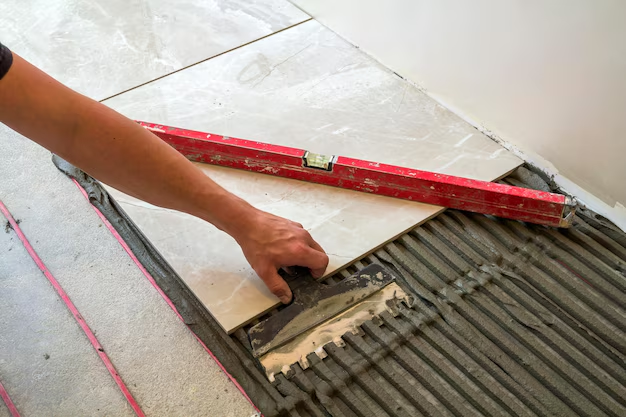Choosing Tile Adhesive for High-Rise Construction: Wind, Load, and Vibration Considerations
Yes, the selection of the appropriate tile adhesive is necessary in high-rise construction. Advanced solutions like polymer tile adhesive, epoxy tile adhesive, and PU-based adhesive are required to meet the demands of wind pressure, structural loads, and constant vibrations, and each is designed to offer durability, flexibility, and crack resistance to both floor and wall applications.
Introduction
In the case of high-rise construction, architects and engineers are very keen on structural stability, safety, and aesthetics. The design and strength of the building are the primary concern, but the materials applied in the finishing also play a role in the long-term performance. Floors, walls, bathrooms, and facades of skyscrapers are still covered with tiles. The effectiveness of these installations, however, depends on the tile adhesive that holds them together.
Unlike low-rise projects, high-rise buildings face unique challenges such as heavy wind loads, constant vibrations, thermal expansion, and higher foot traffic in common areas. Traditional cement-sand mortar often fails to withstand these pressures, leading to cracks, debonding, or popped tiles. Modern adhesives, such as those offered by Redwop, provide the flexibility, bonding strength, and durability needed for these demanding environments.
Why Tile Adhesive Choice Matters in High-Rise Projects
Tile adhesive is not only a bonding substance but a protective agent against all structural forces that may weaken tiled surfaces. There are three major reasons why tile installations are at risk in tall buildings:
- Wind loads: Tall structures move a little with the wind and impose sideways pressure on tiled walls.
- Structural vibration: Everyday use, lifts, machinery, as well as slight seismic activity, create a continuous micro-movement.
- Load and foot traffic: Heavy use in corridors, lobbies, and terraces requires a stronger bond than traditional mortar can provide.
This causes long-lasting, safe installations to require special adhesives.
Polymer Tile Adhesive – Flexibility and Strength Combined
Polymer Tile Adhesive is popular in the construction of high-rise buildings due to its capacity to combine strength with flexibility. It is modified with polymers to form a better bond that is capable of resisting structural movements without cracking.
- Ideal floor tile adhesive for vitrified, porcelain, and natural stone tiles.
- Works in medium to heavy traffic environments such as lobbies, corridors, and common areas.
- It can also be applied to walls in large-format tiles, which require extra support.
Polymer tile adhesive is applied to areas that are frequently vibrated or moved so that the tiles do not move.
Epoxy Tile Adhesive – The Best Choice for Bathrooms and Wet Areas
High-rise projects require a waterproof, chemical-resistant solution in the bathrooms, kitchens, and terraces. Here, Epoxy Tile Adhesive performs.
- Works as a bathroom tile adhesive with unmatched resistance to water seepage.
- Resists cleaning chemicals, heat, and moisture.
- Applicable for both wall tile adhesive and floor tile adhesive applications, in wet environments or humid environments.
- Ideal for industrial kitchens, swimming pools, hospitals, labs, and high-traffic commercial spaces.
Epoxy adhesive guarantees durability where water or chemicals could otherwise weaken bonding.
PU-Based Adhesive – Designed for External Walls and Facades
High-rise façades and external cladding face extreme stress from wind loads, thermal expansion, and constant vibrations. PU-Based Adhesive is specially engineered for such conditions.
- Absorbs structural movements, preventing cracks or tile displacement.
- Excellent for external wall cladding, façades, and stone installations.
- Provides durability against changing temperatures and environmental exposure.
- It may be applied on floors and walls where maximum flexibility is needed.
In high-rise projects that require stability over a long period of time, PU-based adhesive is the final solution.
Applications of Tile Adhesives in High-Rise Construction
Each type of tile adhesive is designed for specific conditions. Broadly, their applications may be summarized as:
- Floor Tile Adhesive – Polymer adhesive on heavy-traffic floors; Epoxy adhesive on wet floors.
- Wall Tile Adhesive – Normal adhesives for interiors; PU-based adhesive for heavy external cladding.
- Bathroom Tile Adhesive – Epoxy adhesive ensures waterproofing and chemical resistance.
- Waterproof Tile Adhesive – Epoxy and PU-based adhesives offer long-term protection.
Best Practices for High-Rise Tile Installation
Even the best adhesive cannot perform without proper installation techniques. Follow these:
- Surface Preparation: Clean and level substrates before applying adhesive.
- Correct Adhesive Selection: Match adhesive type with tile size, material, and building zone.
- Notched Trowel Application: Ensures even adhesive spread and maximum bonding.
- Back-Buttering: Recommended for large-format or heavy tiles.
- Expansion Joints: Prevent stress buildup on large tiled areas in high-rises.
- Follow Manufacturer’s Guidelines: Adhere to open time and curing instructions for maximum performance.
Advantages of the Right Tile Adhesive in High-Rise Projects
- Prevents tile pop-offs under wind and vibration.
- Provides waterproofing in bathrooms and terraces.
- Ensures crack resistance in high-stress environments.
- Reduces maintenance and repair costs.
- Enhances the durability and aesthetics of tiled surfaces.
Conclusion
High-rise buildings place extraordinary demands on construction materials, and tile adhesive is no exception. While polymer tile adhesive provides strength and flexibility for floors and walls, epoxy tile adhesive ensures waterproofing in bathrooms and kitchens, and PU-based adhesive delivers unmatched performance for external cladding.
Choosing the right adhesive ensures durability, safety, and long-term cost savings in high-rise projects.
For expert guidance and tailored solutions for your construction needs, Contact Us today.
FAQs
-
1. Which tile adhesive is best for high-rise building floors?
Polymer tile adhesive works well for heavy-traffic floors, while epoxy adhesive is recommended for wet floors.
-
2. Can wall tile adhesive be used for external cladding in high-rises?
No, normal wall adhesives are not suitable. PU-based adhesive is the best choice for external facades.
-
3. What is the best bathroom tile adhesive in high-rise projects?
Epoxy tile adhesive is ideal because of its waterproof and chemical-resistant properties.
-
4. Is epoxy or PU-based adhesive better for high-rise applications?
Both serve unique needs—epoxy is best for wet areas, while PU-based adhesive is superior for external cladding and vibration resistance.
-
5. Why is cement-sand mortar not recommended in high-rise construction?
It lacks flexibility and bonding strength, making it prone to cracks and tile failures under high-rise stresses.



